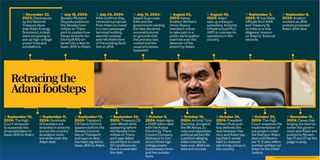
Inset: Indian billionaire Gautam Adani.
Katiba Institute has moved to court to challenge the constitutionality of some sections of the Public Private Partnerships Act over the Adani Group deals, arguing that the exclusion of Parliament from Public Private Partnerships (PPP) agreements violates the Constitution.
The organisation further argues that some sections of the Act undermine the constitutional framework for checks and balances by excluding parliamentary approval for Privately Initiated Proposals (PIPs).
In the petition filed under certificate of urgency, the organisation says that by conferring on the Executive through the PPP Committee the final authority to approve public expenditure under PPPs to the exclusion of Parliament, sections 59, 60, 61, 62 and 72(1) and section 63 of the Public Private Partnerships Act, violate the constitution.
Katiba Institute further said by making discretionary the decision whether PIPs should be subjected to open competitive tendering, section 44(5) and (6) of the PPPA violate Article 227 of the constitution, hence unconstitutional.
“The handling of the JKIA deal raises substantial doubts about the capacity of any subsequent processes related to the project guaranteeing fairness under Article 227 of the constitution,” Katiba Institute said.
The organisation said in the 2024 Budget Policy Statement, the PPP directorate revealed that a total of 31 projects were in the pipeline and at various stages, with most of them as the procurement stage.

Katiba Institute cited the concession to build three electricity transmission lines and two substations, which the Indian conglomerate will operate for 30 years at a cost of Sh95.68 billion.
The deal has been concluded between Kenya Electricity Transmission Company (Ketraco) and Adani Energy Solutions, a subsidiary of Adani Group.
The second deal in the offing is the 30-year concession for the development and operation of the Jomo Kenyatta International Airport (JKIA) by Adani Airports Holdings Ltd, which has already been approved by the PPP Committee.
Through lawyer Henry Paul Gichana, Katiba Institute said the two projects have been originated by PIPs under the PPP Act thereby rendering them uncompetitive contrary to requirements of article 227 of the constitution.
“Their developments and conclusions have been shrouded in a great deal of secrecy and lack of transparency contrary to the provisions of articles 10 and 201 of the constitution demanding openness and accountability as well as sustainable development hence pose a potential threat to public interest,” Mr Gichana said.
He further said the projects have concluded at the sole initiation of the executive arm of government, without involvement and approval of Parliament despite being public projects drawing or intended to draw public funds, either directly or indirectly.
Mr Gichana said the projects have received a great deal of government support as officials publicly defended them, strongly suggesting the conferment of unfair advantage to Adani Group against all other private parties.
Undermine bidders' rights
The lawyer said the possible signing of a concession agreement with Adani Group for operation of JKIA stands to unjustly undermine the rights of other bidders who had expressed interest in the project to a fair procurement system contrary to Article 227(1).
He said section 61(2) of the PPPA requires a private party to commence a project immediately upon signing a concession hence there is a real risk that the Adani Group may commence the implementation of the transmission of electricity signed with Ketraco.
“The court needs to urgently intervene to keep conservatory orders in place to preserve Kenya’s constitutional order and to determine the primary questions on the constitutionality of the PPPA,” he said.
The organisation further said the case raises substantial questions of law that should be handled by a bench of three judges.
Katiba Institute will be asking the court to declare that the unconstitutionality of the PPP Act should apply retroactively concerning Ketraco and JKIA projects, based on the principle that unconstitutional laws or actions are void from the beginning.
“Alternatively, that there are justifiable circumstances under which a declaration of unconstitutionality of legislation should have a retroactive effect, and the circumstances captured under the petition qualify as such justifiable circumstances,” Mr Gichana said.
Meanwhile, the government has challenged the powers of the High Court to determine a case filed by activist Tony Gachoka, Mount Kenya Jurist and three political parties including Wiper Democratic Movement.
In response to the petition challenging the JKIA deal, the government said the High Court lacked the powers to determine the petition as the Petition Committee has the original jurisdiction to determine disputes arising from decisions and processes under the PPP Act.
“The court lacks jurisdiction by virtue of section 75(8) of the Act as the High Court is only empowered with appellate jurisdiction on appeals from the Petition Committee and not the original jurisdiction,” the government said through MMA Advocates.
In the petition, Mr Gachoka accuses the government of intending to hand over JKIA as a gift to Adani.
“The Kenyan Government has sought to consider handing over the existing revenue-generating assets and facilities of KAA as a gift to the 1st- 2nd respondents (Adani Group and Adani Airports Holding) at no apparent benefit to the people of Kenya, through the application of the PPP Act and other laws in a manner that is not open or accountable,” Mr Gachoka said.
He further alleged that the government has engaged in jeopardising the JKIA operations to justify the concession of JKIA on the excuse that Kenyans have failed to manage and operate it in accordance with international standards.
This, he argued, was part of a broader scheme to pressure the Kenya Airports Authority (KAA) into surrendering its mandate to the Adani Group.
Law Society of Kenya (LSK) has also challenged the Ketraco-Adani deal.
The hearing of the cases were adjourned to November 27.










